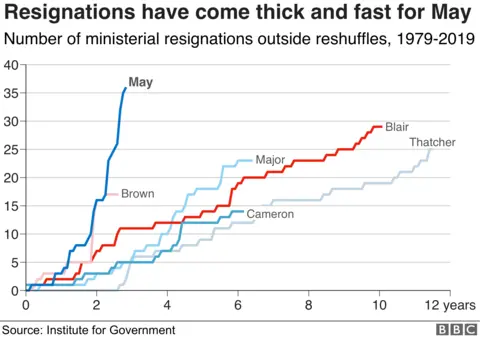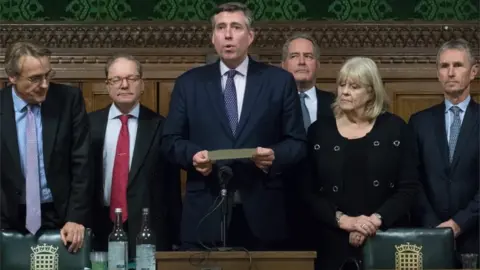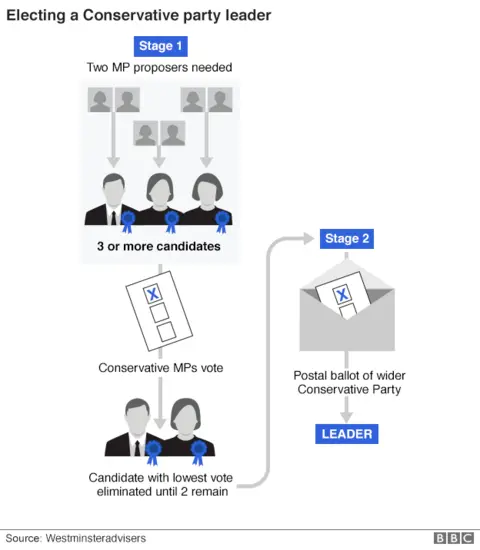Commons leader Andrea Leadsom quits government over Brexit
Commons Leader Andrea Leadsom has quit the cabinet, saying she no longer believes the government's approach will deliver Brexit.
Her resignation comes amid a backlash against Theresa May's Brexit plan from Conservative MPs.
Several cabinet ministers have told the BBC that the PM cannot stay, with one saying it is "the end of the line".
In a letter to Mrs Leadsom, the PM wrote she was "sorry to lose someone of [her] passion, drive and sincerity".
Mrs May also said she disagreed with "the assessment you now give about our approach" to Brexit.

Mrs Leadsom previously ran for Tory leader but withdrew, clearing the path for Mrs May to become prime minister.
As Commons leader, she was in charge of organising government business and had been due to announce when the prime minister's Withdrawal Agreement Bill would be introduced to Parliament.
Her resignation is the 36th by a minister under Theresa May - 21 of them over Brexit - and comes a day before the UK votes in the European elections.
The move came after a day of drama at Westminster in which anger grew at the prime minister's attempt to win backing for the bill - the legislation needed to implement the agreement between the UK and EU on the terms of Brexit.
As part of it, Mrs May has offered a number of changes, including a chance for MPs to hold a vote on another referendum if they back the bill.
Allow X content?

In a letter to the prime minister, Mrs Leadsom - MP for South Northamptonshire - said she did not believe "the UK would be a truly sovereign United Kingdom through the deal that is now proposed".
She also described holding another referendum as "dangerously divisive", and said she was opposed to the government "willingly facilitating such a concession".
Another referendum would "risk undermining our Union which is something I passionately want to see strengthened", she said.
She also attacked the "breakdown of government processes", saying that Brexit-related legislation proposals had not been "properly scrutinised".
She concluded her letter by paying tribute to "the integrity, resolution and determination" of the prime minister and urging her to "make the right decisions in the interests of the country, the government and our party".
But in her response, Mrs May said her bill would deliver Brexit for the UK, and sought to assure her departing colleague that she continued to be opposed to a second referendum - arguing it would be "divisive".
'A step too far'
BBC political correspondent Jonathan Blake said that Mrs Leadsom had made many compromises over Brexit.
"She clearly feels the new improved bill - as Theresa May has styled it - was a step too far," he added.
"It is an extraordinary sequence of events for a key member of the Cabinet to resign on the eve of elections.
"It is unlikely that we will see others follow her immediately, but getting into Friday and the weekend, things could move swiftly."
BBC political editor Laura Kuenssberg said Home Secretary Sajid Javid "isn't going anywhere", but added that his backers said he wasn't happy about the second referendum part of Mrs May's offer.

Who is Andrea Leadsom?
Andrea Leadsom was the MP who stood against Theresa May for leadership of the Conservative Party in 2016, following David Cameron's resignation after the EU referendum.
She decided to withdraw from the race, leaving Theresa May as PM, following an interview in which she suggested that being a mother made her a better candidate for the job.
Mrs Leadsom campaigned for Leave during the Brexit campaign, appearing on the panel at the final TV debate of the campaign at Wembley Arena, alongside Boris Johnson and then Labour MP Gisela Stuart.
She served as environment secretary between July 2016 and June 2017, and more recently as Leader of the House, a role which means she organises and announces government business in Parliament.

Tim Loughton - the Conservative MP who ran Mrs Leadsom's campaign to be party leader - said she had "great integrity", and left because she couldn't support the prime minister's bill.
Pro-EU Conservative MP Dominic Grieve said he was sorry that Mrs Leadsom had resigned, but added that some of this colleagues are "living in world of fantasy".
"They refuse to accept they can't carry out Brexit in the way that they want," he said.
Labour MP Ian Lavery said the resignation showed "the prime minister's authority is shot and her time is up".
His colleague Jess Phillips praised Mrs Leadsom, saying: "I liked Leadsom. She had our back in the complaints process and she was vital in the proxy voting."
'Tough it out'
The minister's resignation capped a difficult day for the prime minister who continued to resist calls to quit herself.
Several cabinet ministers broke cover on Wednesday afternoon to signal their unhappiness with the Withdrawal Agreement Bill, among them Home Secretary Sajid Javid.
Foreign Secretary Jeremy Hunt also requested a private meeting with the PM to discuss the situation.
But BBC political editor Laura Kuenssberg said the PM declined to meet the ministers - both of whom are seen as possible contenders to be the next Conservative leader - and instead seemed determined to "tough it out".
 PA
PAThe 1922 Committee of backbench Conservative MPs had been expected to vote on Wednesday evening on whether to change the party's rules to allow an immediate vote of no confidence in the prime minister.
Current rules dictate that as the PM survived such a vote in December, she cannot face another one for 12 months.
Mrs May is now scheduled to meet the committee's chairman, Sir Graham Brady on Friday.
Laura Kuenssberg said the PM appeared to have bought herself 36 hours.
The PM had already pledged to set a timetable for a new leader to take over after MPs vote on the Withdrawal Agreement Bill. That, in theory at least, is expected to happen on 7 June.

What is in the Withdrawal Agreement Bill?
Mrs May is bringing the Withdrawal Agreement Bill - legislation required to bring her agreement into UK law - to Parliament in early June.
In an attempt to win over MPs across the House, she announced the following concessions:
- A guarantee of a Commons vote on whether to hold another referendum on the government's Brexit deal
- A vote on different customs options, including a government proposal for a temporary customs union for goods - what Mrs May called a "customs compromise"
- A legal obligation for the UK to "seek to conclude alternative arrangements" to replace the Northern Ireland backstop by the end of 2020
- If the backstop does come into force, the bill would guarantee Northern Ireland remains aligned with the rest of the UK and remains in same customs territory
- Legislation to ensure workers rights are "every bit as good, if not better" after Brexit - and guarantees of no dilution in environmental standards
- A legal duty to seek changes to the political declaration on future relations with the EU

What are the Tory leadership rules?

